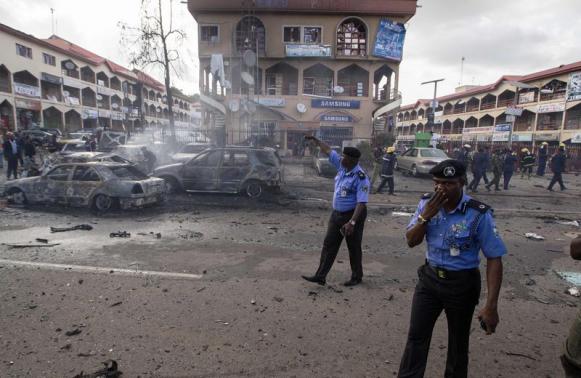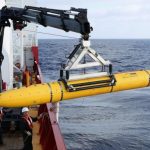(Reuters) – At least 21 people were killed when a suspected bomb tore through a crowded shopping district in the Nigerian capital Abuja during rush hour on Wednesday, police said, adding to the toll of hundreds killed in attacks this year.

It was not immediately clear who was responsible for the blast and no one claimed responsibility. However, militant Islamist group Boko Haram has increasingly targeted civilians in its bloody five-year insurgency.
The suspected bomb would be Abuja’s third in three months and comes as the Nigerian government and military face rising public anger over their inability to protect citizens from daily gun and bomb attacks across Africa’s most populous country.
The explosion rocked a crowded district near the popular Banex Plaza shopping centre in the upscale Wuse 2 neighbourhood just before 4 p.m. (1500 GMT).
After a preliminary investigation, we can confirm that 21 people were killed and 17 injured, police spokesman Frank Mba told reporters at the scene, adding that one suspect had been arrested.
Another suspect was killed by soldiers as he tried to escape on a motorcycle, the spokesman for Nigeria’s National Information Centre said.
Witnesses said the blast shattered windows, sent smoke billowing into the air and carved out a large crater.
One local man, Shuaibu Baba, was in a shop making photocopies when the blast hit, killing his taxi driver who was waiting for him outside.
I lost a driver. And why? Because I came to photocopy for 10 naira ($0.06) a page, he said.
I begged him to take me here and this is the end.
Officials said the explosion hit while the district was at its busiest, packed with shoppers and rush-hour commuters.
I heard a loud blast, it shattered the windows of the shop. We ran out. A lot of people ran too, some with bloodstains, said Gimbya Jafaru, who was shopping nearby.
DAILY ATTACKS
Nigeria has been racked by almost daily bomb and gun attacks, widely suspected to be the work of Boko Haram, a group that has killed thousands since 2009 in its drive to carve out an Islamist state in the north.
A separate blast rocked an area in the northeastern Adamawa state on Wednesday, but no one was injured, local police spokesman Othman Abubakar said.
Abuja has been a target for bombs. A suspected car bomb in May killed at least 15 and an attack on a bus station a month earlier at least 75.
Boko Haram, whose name roughly translates as Western education is sinful, initially attacked government and security targets, as well as churches and Muslim leaders who rejected its brand of Islam.
Recently it has begun targeting ordinary civilians more, apparently emboldened by the global publicity that followed its kidnapping of more than 200 girls from a school in the remote Borno village of Chibok in April.
Nigerian media reported this week that northeast Borno state had been hit by another mass abduction over the weekend. However, the government said on Wednesday it had found no proof of a fresh large-scale kidnapping.
Based on available facts before us there was no abduction of 60 persons in Borno state, the National Information Centre said in a statement.
Security forces launched an investigation after the reports that as many as 91 people had been kidnapped over the weekend when gunmen raided villages in Borno.
(Corrects first paragraph reference to death toll this year as hundreds instead of thousands)
(Additional reporting by Abraham Terngu and Isaac Abrak; Writing by David Dolan; Editing by Andrew Roche)





